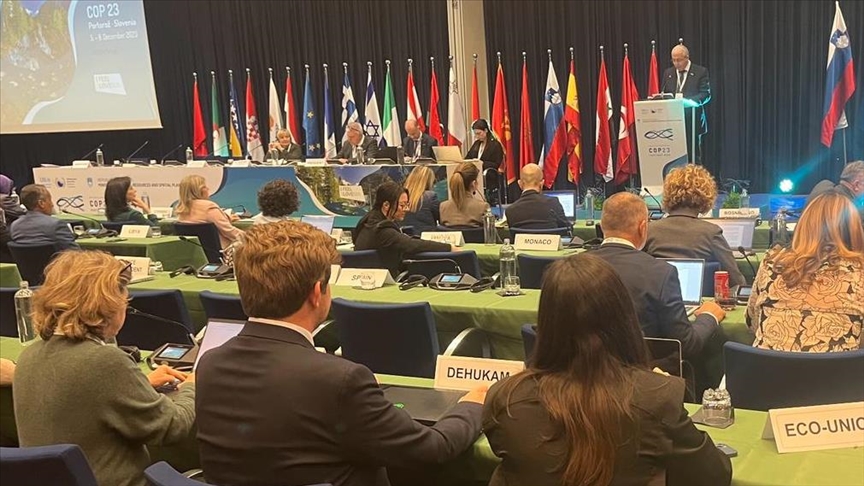ISTANBUL
The Climate Change Regional Activity Center, which will be established in the Turkish metropolis of Istanbul and will operate under the umbrella of the UN, will carry out national and regional projects related to reducing the effects of climate change in the Mediterranean and ensuring regional adaptation to climate change.
The idea of establishing such a center in Türkiye was first raised at the 22nd Meeting of the Contracting Parties to the Barcelona Convention and its Protocols (COP22), which was held in Antalya in 2021 with the presence of first lady Emine Erdogan.
Then a proposal was made to make the Mediterranean Climate Change Research Center (AIDAM) located within the Ankara University National Center for the Sea and Maritime Law (DEHUKAM) a component of the UN Environment Program Mediterranean Action Plan (UNEP/MAP) and to gain the status of a Climate Change Regional Activity Center.
At the 23rd Meeting of the Contracting Parties to the Barcelona Convention (COP23) held in Slovenia this year, the decision to establish the center was unanimously adopted due to negotiations conducted by the Turkish delegation represented by Deputy Minister of Environment, Urbanization and Climate Change Fatma Varank and diplomatic initiatives conducted by the Foreign Ministry.
The center will complete the establishment process within two years and will be opened at the 24th Meeting of the Contracting Parties to the Convention for the Protection of the Marine Environment and the Coastal region of the Mediterranean (COP 24) to be held in December 2025.
It will carry out national and regional projects on reducing the effects of climate change on the Mediterranean region and ensuring regional adaptation to climate change by making use of UN and European Union funds.
Role model
DEHUKAM CEO Mustafa Baskara told Anadolu that the Barcelona Convention is a convention adopted against marine pollution as part of the UN Environment Program Mediterranean Action Plan for the protection of the Mediterranean Sea against pollution as part of regional seas.
Describing this convention, to which all coastal states in the Mediterranean region and the EU are parties, as more effective and functional than other regional marine protection conventions in the world, he said “Türkiye has an important position here because it is the only country in the world that is subject to two different marine protection conventions at the same time.”
“The fact that it is a party to both the Barcelona Convention in the Mediterranean and the Bucharest Convention in the Black Sea and that it can manage the diplomatic processes of these two puts Türkiye in a different position, which is not an example.”
He emphasized that the Mediterranean Sea is much more affected by climate change than other seas in the world and that Türkiye is one of the countries experiencing the effects of climate change in its geography in the most effective way.
Baskara further stressed that the establishment of the center in the country will be a role model for other studies in the world in terms of generating added value from numerous initiatives and studies conducted in this area internationally.
He said the center will be subjected to analysis, work together with other regional activity centers in the two-year period and will be provided with a structure that will benefit from UN funds in an equal and fair way.
Expressing that the climate change studies conducted in the Mediterranean do not see the value they deserve at the moment, Baskara said: “Currently, the share of combating climate change in the budget of the Barcelona Convention is limited to 4%.”
“The center will support research on prevention, mitigation and adaptation to the effects of climate change in the Mediterranean,” he noted, adding: “It will encourage and coordinate more regional studies in order for the Mediterranean to see the value it deserves, and it will ensure that more studies are carried out by finding new project ideas.”
Differences from others
Baskara also said there are many aspects of climate change in a technical sense, and the studies and research conducted on them will be coordinated with the support of Türkiye in a way that will serve the whole world under the umbrella of the UN.
“We attach importance to the independence and impartiality of the center,” he said.
“It was an appreciation of the Environment, Urbanization and Climate Change Ministry for carrying out this work within DEHUKAM’s body, and the UN welcomed it,” he said, noting that “combating climate change is not an issue where countries can get the results from today to tomorrow.”
“At this point, we are also committed to operating to make significant contributions to this struggle.
“The studies to be carried out in the regional sense, the activities to be carried out, will not only achieve the result of reducing the impact of climate change in the Mediterranean but will also serve as an example for other regional maritime conventions under the umbrella of the UN,” he emphasized.
Explaining that there are six separate regional activity centers under the umbrella of the Barcelona Convention, Baskara pointed out that the center will be different from the others in terms of inclusiveness.
“Each of these centers works separately for marine litter, biodiversity, marine field planning, information collection and coordination,” he said, adding: “Unlike these, the center we have established is in a position that addresses the entire Barcelona Convention, approaching the issue from a more comprehensive framework.”

